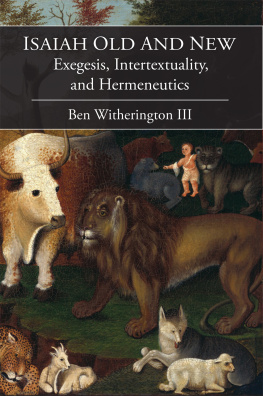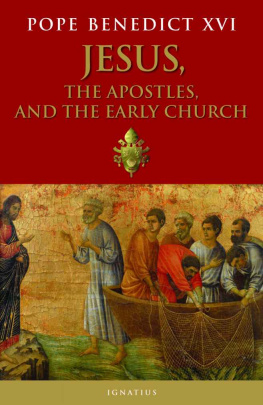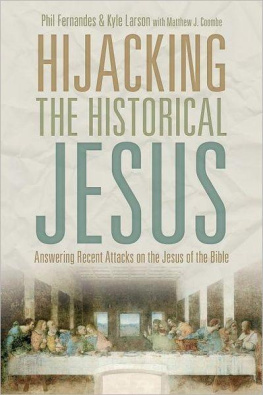
What Have They Done with Jesus?
Beyond Strange Theories and Bad HistoryWhy We Can Trust the Bible
Ben Witherington III

To all my friends at CBS
Miguel, Maureen, Shoshanah, John, Dustin, and Issah
it was wonderful to work with you in the lands of the Bible.
In no case can any distinct separation be achieved between the genuine words of Jesus and constructions of the community. We do not escape the fact that we know Jesus only as the disciples remembered him. Whoever thinks that the disciples completely misunderstood their Master or even consciously falsified his picture may give fantasy free rein. From a purely scientific point of view, however, it is logical to assume that the Master can be known through his disciples words about him and their historical influence.
Nils Dahl,
Jesus the Christ:
The Historical Origins of
Christological Doctrine
The Resurrection of Jesus is the central fact of Christian devotion and the ground of all Christian thinking. The Resurrection was not a solitary occurrence, a prodigious miracle, but an event within a framework of Jewish history, and it brought into being a new community, the church. Christianity enters history not only as a message but as a communal life, a society. The intellectual effort of the early church was at the service of a much loftier goal than giving conceptual form to Christian belief. Its mission was to win the hearts and minds of men and women and to change their lives. Christian thinkers appealed to a much deeper level of human experience than had the religious institutions of society or the doctrines of philosophers. It narrated a history that reached back into antiquity even to the beginning of the world, it was filled with stories of unforgettable men and women (not all admirable) who were actual historical persons rather than mythical figures. The faithful of one generation were united to the faithful of former times, not by a set of ideas or teachings (though this was assumed) but by the community that remembered their names. They trailed their thoughts after the lives of othersso there was no Christian thinking without the church.
Robert L. Wilken,
The Spirit of Early Christian Thought
Contents
THE JESUS WE NEVER KNEW AND THE FOLLOWERS HE NEVER HAD
Why is it that we are hearing so many new things about Jesus and his earliest followers these days? Has someone struck the mother lode and found all kinds of new information about Jesus and first-century Christians? Have archaeologists dug up previously unknown documents that provide shocking new credible evidence that Jesus was married to Mary Magdalene, or his mother Mary was a supporter of revolutionaries in Galilee, or James was a hard-line Judaizer, or Paul was a renegade Zealot, or Peter went to Iraq (known then as Babylon) and wrote a letter from there? Are there really recently recovered first-century documents that tell a very unfamiliar tale about the life of Jesus and the origins of Christianity, providing evidence so compelling that it eclipses and corrects what we have long heard about these subjects?
Right from the beginning of this study I must say, Caveat emptor! Readers should beware of shocking new claims about Jesus or his earliest followers based on flimsy evidence. They need to read the fine print on the bottle of so-called truth serum before swallowing the contents in a single gulp. A perfect illustration of my point is the long-ballyhooed secret Gospel of Mark supposedly discovered by Morton Smith in 1958, which included a value-added story about Jesus having an encounter with a naked youth who ran off from the posse in the Garden of Gethsemane. It looks now as if we were being scammed by Professor Smith: his fraud has been thoroughly exposed to the light of day.
But some people maintain that the major fraud was perpetrated in a more orthodox direction. They claim weve been snookered into thinking that earliest Christianity was far more uniform than it in fact was. Relying on secret teachings showing that Jesus was closer to later Gnostics than to earlier Jewish sages, they believe that there was at least one Jesus community that simply meditated on Jesuss sayings (ignoring his death and resurrection). Are those folks rightare there really lost Christianities that can trace their pedigree all the way back to the first century, communities of faith that were suppressed by the church and only now are getting their proper due? Was earliest Christianity really like dueling banjos playing competing and discordant tunes?
The news media are all abuzz with these sorts of questions, and network after network is running specials that address such issues. Recently I did an interview with a major network for a Christmas show on Mary and the virginal conception, and the first question out of the chute was, Could Mary have been a temple prostitute in the Jerusalem Temple who was raped by someone there? It was suggested that this is why Luke, in his gospel, has Jesus say, Didnt you know I had to be in my Fathers house? (2:4152) when Jesus visited there as a twelve-year-old. Inquiring minds want to know: Have we been duped about Jesus and his earliest followers?
Perhaps a better set of questions might be, What is it about our culture that makes us prone to listen to sensational claims about Jesus and his earliest followers, even when there is little or no hard evidence to support such conjectures? Why are we especially prone to this when it comes to the origins of Christianity? Why would a poorly researched but readable thriller like The Da Vinci Code, which claims to reveal startling new truths about Jesus and his life, create such a sensation in our culture? Lets pause and reflect for a moment on the religious character of our own culture.
TAKE A CULTURE, A RELIGIOUS CULTURE: GULLIBLES TRAVELS
In America we live in a Jesus-haunted culture that is biblically illiterate. Jesus is a household name, and yet only a distinct minority of Americans have studied an English translation of the original documents that tell us about Jesus, much less read them in the original Greek. In this sort of environment, almost any wild theory about Jesus or his earliest followers can pass for knowledge with some audiences, because so few people actually know the primary sources, the relevant texts, or the historical context with which we should be concerned. In our soap opera culture, perhaps it was inevitable that someone would turn the story of Jesus into a soap opera. The problem is, some people are naive enough to believe it. Maybe we need to heed the old saying of my grandmother: Dont be so open-minded that your brains fall out. Its still good advice. But there are other factors than just gullibility that are in play as well.
There are a large number of people in America whose spiritual birth certificate comes from the state of Missouri: they say, Show me. In other words, theyve been burned enough by bad experiences in the church or by extravagant claims by preachers selling snake oil or simply promoting themselves that they position themselves resolutely at the other end of the spectrum from gullibletheyre profoundly skeptical, particularly of traditional answers. Strange as it may seem, while these skeptical folks wont listen patiently to old answers theyve heard before (maybe even heard in church), they will gladly listen to new theories, even when there is little or no solid evidence to support them.
Another characteristic of our culture is that we have bought into the essential sales pitch which drives our economy. All too often we get caught up in the myth that the latest is the greatest; we buy into the new is true phenomenon. But frankly, historical truth can as often, if not more often, be found in old sources and old traditions than in new ones. In fact, I would say that historical truths are far more likely to be found in older sources that have stood close critical scrutiny and the test of time.
Next page












